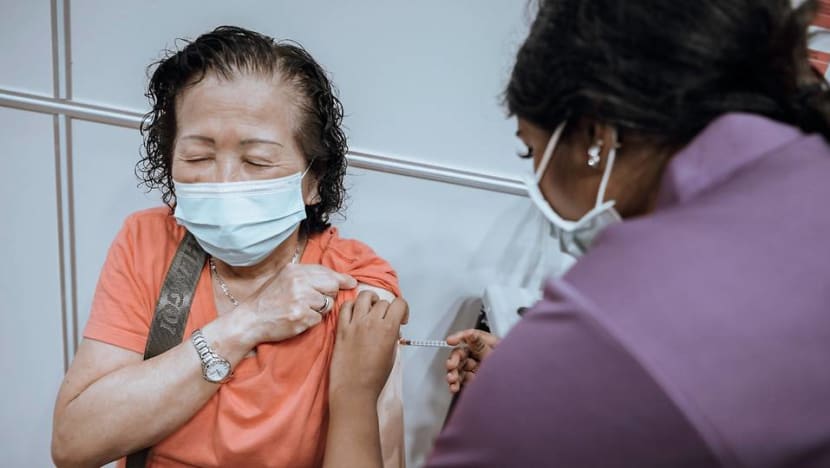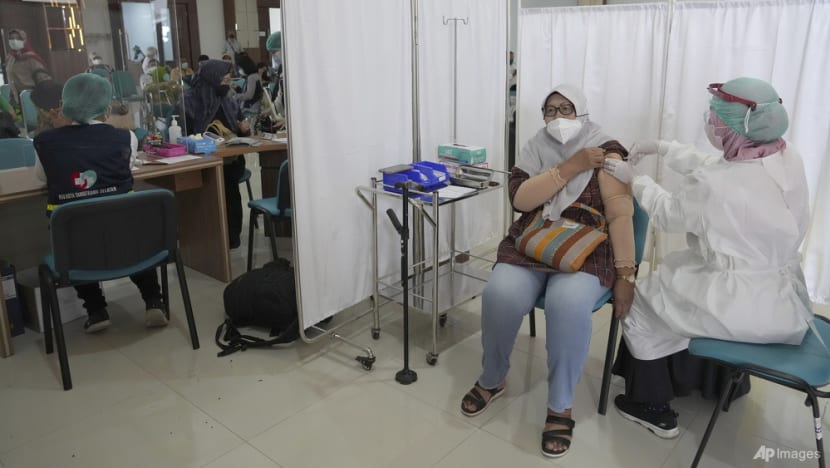Commentary: Should you get a second COVID-19 booster shot?
Receiving a second COVID-19 booster shot will strengthen immunity, with little risk, in vulnerable groups of people but the additional benefits may not be so significant in younger, healthy populations, says this epidemiologist.

HOUSTON, Texas: In late March, the United States Food and Drug Administration authorised a second booster shot of COVID-19 vaccines for vulnerable populations in the US, a move that was soon after endorsed by the Centers for Disease Control and Prevention.
People aged 50 years and older and certain immunocompromised individuals who are at higher risk for severe disease, hospitalisation and death are eligible four months after receiving the initial booster shot. A second booster shot is equivalent to a fourth dose for people who received a Pfizer-BioNTech or Moderna mRNA series or a third dose for those who received the single-shot Johnson & Johnson vaccine.
In Israel, people in these same vulnerable categories began receiving fourth doses in January. The United Kingdom recently started administering a fourth dose for people 75 years old and older and coined it a “spring booster”. In Germany, those over 60 years old are now eligible for a fourth shot of the mRNA series.
The latest recommendations have left many wondering about the importance of boosters for protection against COVID-19. Does the third shot wane over time? Is a fourth dose necessary? What if you’ve had a previous infection?
After reviewing the mounting body of research on how the immune system shifts over time following each dose, it is clear that another booster for vulnerable populations has meaningful benefits with very little risk.
HOW EFFECTIVE IS THE FIRST BOOSTER SHOT?
There is clear evidence that a third dose of the mRNA series – or the first booster dose – was, and still is, critical in ensuring a robust immune response against the Omicron variant for all age groups. This is in part because the immune response wanes over time and also in part because Omicron has proved to be partially effective at evading immunity from the existing COVID-19 vaccines and from prior infections.
But then the question becomes: How well is immunity from the first booster holding up over time?
The best real-time data to follow on vaccine effectiveness over time is in the UK. The UK Health Security Agency currently has follow-up data for 15 weeks after the third dose or the first booster shot. In its latest report, the effectiveness of vaccines against infection wanes significantly after a third dose.
In the UK report, vaccine effectiveness against hospitalisation is holding up much better compared to effectiveness against infection. But even protection against hospitalisation is slightly decreasing over time.
While this data is insightful, 15 weeks of follow-up data isn’t very helpful in the US because many Americans had gotten their third dose up to 24 weeks ago.
A recent study assessed the durability of a Moderna third dose after six months. Researchers found waning levels of neutralising antibodies six months after the booster. The CDC also found significant waning protection against emergency department and urgent care visits five months after the first booster. Vaccine effectiveness against hospitalisation decreased a little but largely held up five months after the booster.

The studies mentioned above pooled all age groups. But researchers know that older adults don’t mount as durable an immune response as younger people. This explains why breakthrough infections have occurred at a much higher rate among people ages 65 and up.
A recent study in the Lancet assessed the durability of a third dose among people aged 76 to 96 years old. Researchers found that the third dose improved neutralising antibodies, but in the face of Omicron, antibodies still dropped substantially following a booster.
HOW EFFECTIVE WILL A SECOND BOOSTER SHOT BE?
Now that Israel has been delivering a fourth dose for several months, researchers have some data to rely on to assess its effectiveness. There are three studies that have been released so far, of which one has not yet been peer-reviewed.
In one study published in the New England Journal of Medicine, scientists assessed the rates of infection and severe illness after a fourth dose – or second booster – among more than a million people aged 60 and older in Israel.
The researchers found that after a fourth dose, the rate of COVID-19 infection was two times lower than after a third dose. However, this protection quickly waned after six weeks. They also found the rate of severe disease was four times lower compared to those who received only three doses. It’s important to note, though, that hospitalisations among both groups were very low.
Importantly, another study assessed the effectiveness of a fourth dose among younger healthcare workers in Israel. The results confirmed that antibody levels dropped significantly five months after the third dose.
What does the data say about the efficacy of booster shots and why are there mixed scientific views? Find out on CNA's Heart of the Matter:
Unfortunately, the effectiveness of the fourth dose was no different from the effectiveness of a third dose in this population of younger health care workers. In other words, there may not be meaningful benefits of a second booster of the same formula for young, healthy populations.
Researchers carried out a third study, one that has not yet been peer-reviewed, at a large health care system in Israel among people aged 60 to 100 years. Among 563,465 patients in the health care system, 58 per cent received a second booster.
During the study period, 92 people who received the second booster died, compared to 232 people who had only the first booster. In other words, the second booster equated to a 78 per cent reduction in death compared to the first booster alone.
HOW EFFECTIVE WILL BOOSTER SHOTS BE PAIRED WITH A COVID-19 INFECTION?
The combination of being both vaccinated and having experienced a COVID-19 infection is called “hybrid immunity”. More than 35 studies have shown that hybrid immunity offers complementary and broad protection. This is because immunity from the vaccines targets the spike protein – after which the COVID-19 vaccines were designed – and infection-induced immunity aims more broadly at the whole virus.
So, it is not unreasonable to skip a second booster with a confirmed infection of Omicron. This doesn’t mean that people should purposefully get SARS-CoV-2, the virus that causes COVID-19. But it is clear that hybrid immunity is a viable path to protection.
In short, there is strong evidence that a fourth dose – or second booster – provides meaningful protection among vulnerable populations, including people over 60. So another booster is reasonable for some groups. And while a fourth dose may benefit a select group, it is far more important that people receive their first, second and third doses.
Katelyn Jetelina is an Assistant Professor of Epidemiology at the University of Texas Health Science Center in Houston. This commentary first appeared in The Conversation.













